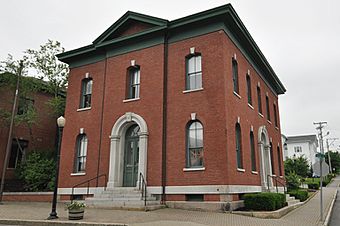Machias Post Office and Customhouse facts for kids
Quick facts for kids |
|
|
Machias Post Office and Customhouse
|
|
 |
|
| Location | Main and Center Sts., Machias, Maine |
|---|---|
| Area | 0.5 acres (0.20 ha) |
| Built | 1872 |
| Built by | Horatio L. Hill |
| Architect | Alfred B. Mullett |
| Architectural style | Italianate |
| NRHP reference No. | 77000090 |
| Added to NRHP | November 23, 1977 |
The Machias Post Office and Customhouse is a special old building in Machias, Maine. It stands at the corner of Maine and Center Streets. Built in 1872, it shows off a cool style called Italianate architecture. This means it looks a bit like old Italian buildings.
This historic brick building was added to the National Register of Historic Places in 1977. This list helps protect important places in the United States. Today, the building is no longer a post office. It is now home to offices for the Machias Savings Bank.
Contents
What Does It Look Like?
The Machias Post Office and Customhouse is a two-story building. It is made of red brick and sits on a strong granite base. The roof is shaped like a pyramid, which is called a hip roof.
Main Street Side
The front of the building faces Main Street, which is also U.S. Route 1. This side has three main sections. The middle section sticks out a little. It has a triangular top, like a small roof, called a pediment.
The main door is in this middle section. It is shaped like a round arch. It has special stones called keystones at the top. There are also tall, flat columns next to the door.
Windows and Details
The windows on the first floor are also round at the top. The windows on the second floor have a slightly curved top, like a gentle arch. All the windows have stone sills at the bottom. They also have keystones above them, just like the main door.
The side of the building that faces Center Street is longer. It has five sections. It looks very similar to the Main Street side, with the same kinds of doors and windows.
Why Was It Built?
For many years, the government rented spaces for the post office and customhouse in Machias. These places often changed, and they weren't always right for the job.
A New Idea
In 1867, the United States Congress decided to build a proper building. This would give the town a permanent place for its post office and customhouse. The land for the building was bought in 1870. Construction finished in 1872.
Who Designed It?
The building was designed by Alfred B. Mullett. He was a very important architect for the United States government at the time. He worked for the United States Department of the Treasury. A local builder named Horatio L. Hill oversaw the construction. To save money, many of the building materials came from nearby areas.



